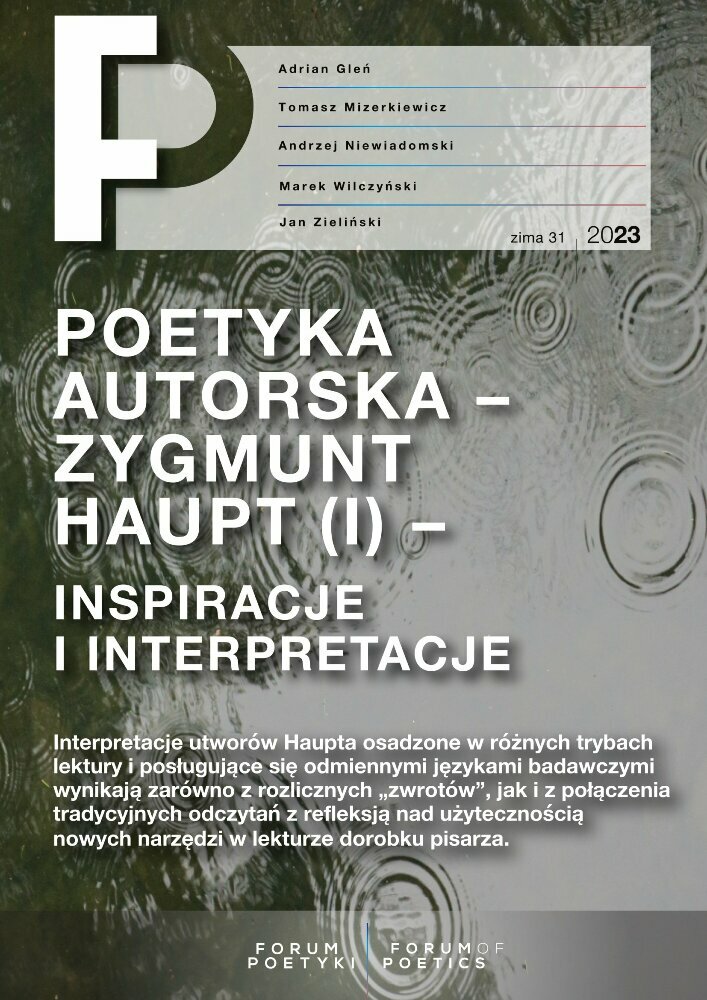Abstract
This article was inspired by the importance which Zygmunt Haupt attached to the “willing suspension of disbelief” on behalf of the reader. It discusses how Coleridge’s formula may function in a context that is not strictly poetic. A “suspension of disbelief” and poetic faith are complementary concepts which encourage in literary and cultural studies deep reflection on the demise of religious faith in favor of “poetic faith,” which, as M.H. Abrams writes, may essentially be described as “natural supernaturalism.” The article argues that this modernist experience may be found in Haupt’s works.
References
Abrams, Meyer Howard. Natural Supernaturalism. Tradition and Revolution in Romantic Literature. New YorkLondon: W. W. Norton, 1973.
Abrams, Meyer Howard. „Rationality and Imagination in Cultural History: A Reply to Wayne Booth”. Critical Inquiry 2, 3 (1976): 447–464. DOI: https://doi.org/10.1086/447851
Carlyle, Thomas. Sartor Resartus. Życie i zdania pana Teufelsdröckha w trzech księgach. Tłum. Sygurd Wiśniowski. Warszawa: Nakład i druk S. Lewentala, 1882.
Coleridge, Samuel Taylor. Biographia literaria. Tłum. Bartosz Działoszyński. Warszawa: PWN, 2019.
Coleridge, Samuel Taylor. Biographia Literaria or Biographical Sketches of My Literary Life and Opinions. New York: Leavitt, Lord& Co., Boston: Crocker & Brewster, 1834.
Giedroyc, Jerzy, Zygmunt Haupt. Listy 1947–1975. Red. Paweł Panas. Warszawa: Towarzystwo „Więź”, 2022.
Haupt, Zygmunt. Baskijski diabeł. Opowiadania i reportaże. Red. Aleksander Madyda. Wstęp Andrzej Stasiuk. Wołowiec: Wydawnictwo Czarne, 2016.
Haupt, Zygmunt. Z Roksolanii. Opowiadania, eseje, reportaże, publicystyka, warianty, fragmenty (1935–1975). Red. Aleksander Madyda. Toruń: Wydawnictwo Naukowe Uniwersytetu Mikołaja Kopernika, 2018.
Łapiński, Zdzisław. „Dwaj nowocześni: Leśmian i Przyboś”. Teksty Drugie 5-6 (1994): 79–87.
Mizerkiewicz, Tomasz. „«Ale będę. Ale będę». Proza Zygmunta Haupta a nowoczesna kultura obecności”. W: Po tamtej stronie tekstów. Literatura polska a nowoczesna kultura obecności, 177–232. Poznań: Wydawnictwo Naukowe UAM, 2013.
Niewiadomski, Andrzej. „Jeden jest zawsze ostrzem”. Inna nowoczesność Zygmunta Haupta. Lublin: Wydawnictwo UMCS, 2015.
Stevens, Wallace. „O nowoczesnej poezji”. Tłum. Czesław Miłosz. W: Miłosz, Czesław. Przekłady poetyckie, red. Magdalena Heydel, 283–284. Kraków: Znak, 2005.
Stevens, Wallace. Opus Posthumous. Red. Samuel French Morse. New York: Alfred A. Knopf, 1957.
Stevens, Wallace. „Studium dwóch gruszek”. Tłum. Czesław Miłosz. W: Miłosz, Czesław. Wypisy z ksiąg użytecznych, 85–86. Kraków: Znak, 2000.
Stevens, Wallace. The Collected Poems of Wallace Stevens. Red. John N. Serio, Chris Beyers. New York: Vintage Books, 2015.
Stevens, Wallace. „To Henry Church, October 15, 1940”. W: Letters of Wallace Stevens, red. Holy Stevens, 376–378. London: Faber and Faber, 1966
Wasserman, Earl. The Subtler Language. Critical Readings of Neoclassic and Romantic Poems. Michigan: Johns Hopkins Press, 1959
License
Copyright (c) 2023 Tomasz Garbol

This work is licensed under a Creative Commons Attribution-NonCommercial-NoDerivatives 4.0 International License.
Authors of articles are responsible for securing the rights to other publications (texts, tables, drawings and other illustrations) quoted or reproduced in their texts.

